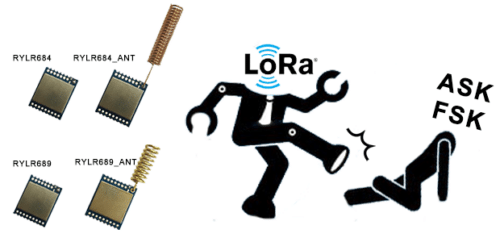- The LoRa modules are suitable for a wide range of use cases including asset tracking, smart agriculture, and various other IoT applications.
- The modules come with a metal covering that protects them against EMI interference when surrounded by noise from other devices, thus, ensuring better performance.
- The products are said to replace the energy-consuming traditional Frequency Shift Keying (FSK) and Amplitude Shift Keying (ASK) technology.

The RYLR684/RYLR689 from Reyax Technology is a cost-effective LoRa and (G)FSK (Gaussian frequency-shift keying) transceiver module that is suitable for long-range wireless applications. The cost-effective LoRa modules are based on a Semtech LLCC68 chip and have a programmable transmission power level from -20dBm to 22dBm. This allows the designers to optimize the range and power of the transmitter for each use case thus reducing the energy consumption of battery-powered devices. The LoRa modules are suitable for a wide range of use cases including asset tracking, smart agriculture, smart buildings, industrial automation and various other IoT applications.
LoRa (Long Range) is a low-power, wide-area network (LPWAN) technology used for Internet of Things (IoT) devices and machine-to-machine (M2M) communications. It enables long-range communications at low data rates and provides high network capacity, making it ideal for large-scale IoT applications where battery life and data transmission costs are critical. (G)FSK or Gaussian Frequency Shift Keying is a type of digital modulation technique used in wireless communication systems. It offers a more efficient use of the available bandwidth and a lower level of out-of-band emissions, making GFSK a better choice for certain types of wireless applications.
The products have been launched to replace the traditional Frequency Shift Keying (FSK) and Amplitude Shift Keying (ASK) technology that had higher energy consumption. To enhance the sensitivity and achieve better performance, both the modules come with metal covering that protects them against EMI interference, and offer considerably better performance even when surrounded by noise from other devices.





